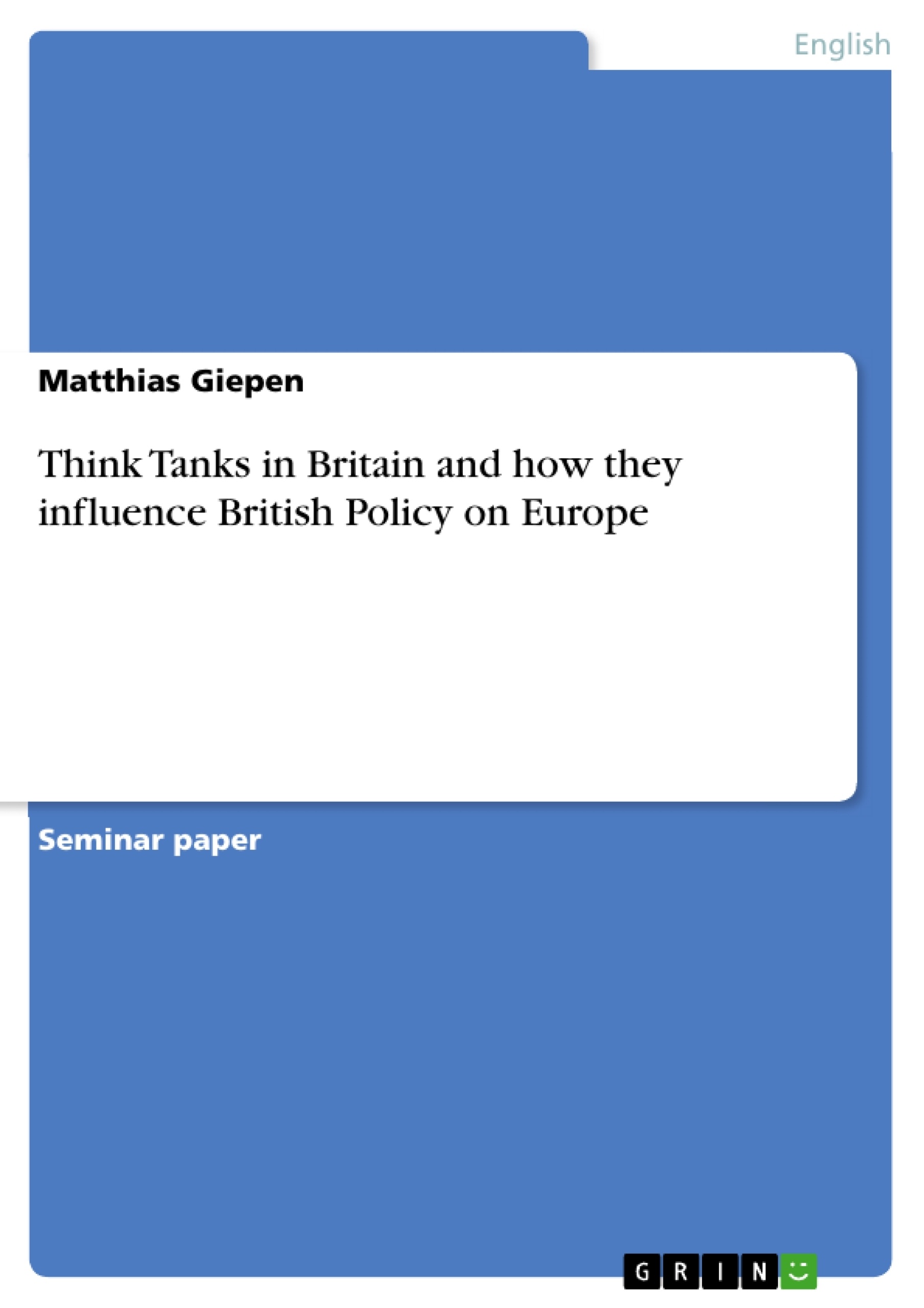'The 2007 Survey of Think Tanks' states that out of a total of 1198 think tanks in Western Europe, 283 operate from within the United Kingdom.1 This is by far the highest number amongst the member states of the EU. There is a long tradition of think tanks in Britain. Informal groups and individuals
were offering political advice since the eighteenth century, maybe earlier.2
In this essay I try to examine some of the major British think tanks that focus on the European Union and their politics concerning the EU. Where possible, I will give evidence on how they actually influenced British policy making in terms of the EU. I will examine the possibilities of how think tanks can influence governments and public opinion and I will summarize some of the
criticism on think tanks in general.
[...]
Inhaltsverzeichnis (Table of Contents)
- Introduction
- Definition
- Examples
- Open Europe
- The Centre for Policy Studies
- Center for European Reform
- Possible ways of taking Influence
- The Role of the CER in the Saint Malo case
- Criticism
- Conclusion
- References
Zielsetzung und Themenschwerpunkte (Objectives and Key Themes)
This essay examines major British think tanks focusing on the European Union and their policies concerning the EU. It aims to provide evidence on how these think tanks influence British policymaking in terms of the EU, examining the possibilities of how think tanks can influence governments and public opinion. The essay concludes by summarizing some of the criticism on think tanks in general. Key themes include:- The role of think tanks in British policymaking related to the European Union
- The definition and characteristics of think tanks
- Examples of influential British think tanks and their specific policies regarding the EU
- The potential influence of think tanks on governments and public opinion
- Criticism of think tanks
Zusammenfassung der Kapitel (Chapter Summaries)
- Introduction: This chapter introduces the topic of think tanks in Britain, highlighting their prevalence and historical context. It also sets out the essay's objectives and scope.
- Definition: This chapter explores the definition of "think tank," examining various interpretations and highlighting the complexities associated with the term. It presents a typology of think tanks, outlining key characteristics and examples.
- Examples: This chapter provides detailed examples of influential British think tanks, including Open Europe, The Centre for Policy Studies, and the Center for European Reform. It outlines their respective policies and positions concerning the European Union.
- Possible ways of taking Influence: This chapter explores specific examples of how think tanks exert influence on policymaking. It focuses on the role of the Center for European Reform in the Saint Malo case, illustrating their impact on European integration discussions.
Schlüsselwörter (Keywords)
The primary keywords and focus topics of this text include think tanks, British policy, European Union, influence, government, public opinion, criticism, Open Europe, Centre for Policy Studies, Center for European Reform, Saint Malo case, and European integration.Frequently Asked Questions
What is the role of think tanks in British politics?
Think tanks in the UK offer political advice, influence government policy making, and shape public opinion, particularly concerning the European Union.
Which British think tanks focus on the European Union?
Key examples include Open Europe, the Centre for Policy Studies (CPS), and the Center for European Reform (CER).
How do think tanks exert influence on the government?
They influence policy through research papers, media appearances, direct consultation with politicians, and by providing a platform for debate, as seen in the Saint Malo case involving the CER.
What are the common criticisms of think tanks?
Criticisms often involve concerns about transparency, funding sources, political bias, and the extent to which they bypass democratic processes.
Why does the UK have so many think tanks compared to other EU countries?
The UK has a long tradition of informal political groups and advisory bodies dating back to the 18th century, fostering a robust environment for think tanks.
- Citation du texte
- Matthias Giepen (Auteur), 2008, Think Tanks in Britain and how they influence British Policy on Europe, Munich, GRIN Verlag, https://www.grin.com/document/114929



